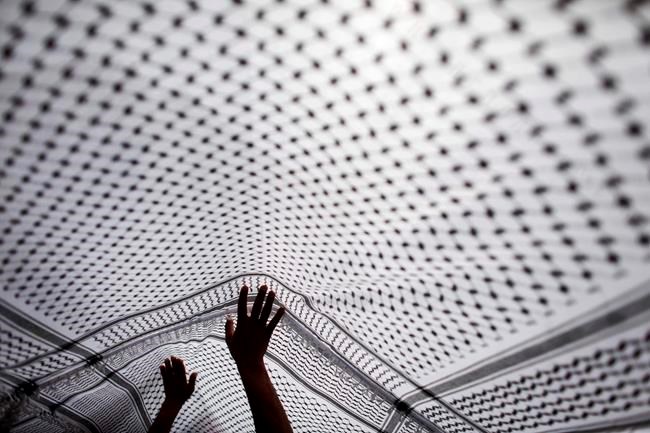TORONTO — The Speaker of Ontario's legislature is standing by a ruling that bans people in the building from wearing keffiyehs, which he says are being worn to make a political statement, even after the premier and all opposition parties asked him to reverse it.
The legislature has a long-standing rule that members can't use props, signage or accessories intended to express a political statement, and Speaker Ted Arnott said after "extensive research" he has concluded that keffiyehs meet that definition.
"It's extremely politically sensitive, obviously, but procedurally I believe I made the right decision in the sense of past rulings of speakers and precedents and traditions," Arnott said Thursday after question period.
"In my opinion, having done the research, it appeared to me that the keffiyeh is being worn to make a political statement."
A keffiyeh is a checkered scarf typically worn in Arab cultures that has come to symbolize solidarity with Palestinians.
Members of provincial parliament often ask special permission to wear an item that may break the rules, such as ribbons for a particular cause's awareness day, and they do that by seeking unanimous consent of the legislature.
NDP Leader Marit Stiles moved a unanimous consent motion Thursday morning saying the keffiyeh is a culturally significant clothing item in Palestinian, Muslim and Arab communities and should be allowed in the house, but Arnott said he heard a few people say "no."
The loudest "no" came from Progressive Conservative backbencher Robin Martin.
"I think (Arnott's ruling) is the correct decision, in the same way we can't use other kinds of political clothing," Martin said after question period.
"We can't wear T-shirts that say, 'Free the hostages' or wrap ourselves in a flag or whatever. We have to follow the rules of the legislature. Otherwise, we politicize the entire debate inside the legislature and that's not what it's about ... we use our words to persuade, not our items of clothes."
Martin's position is in contrast to her leader's, with Premier Doug Ford calling on the Speaker to reverse his decision.
"It really comes down to uniting Ontarians and communities," the premier said Thursday morning at an unrelated press conference. "We see the division right now that's going on. It's not healthy, and this will just divide the community even more."
Stiles said she was disappointed her motion didn't pass and pressed the government to act.
"I think the premier needs to now make sure that his caucus does the right thing," she said.
The issue came to Stiles' attention last week when one of her staffers, who wears a keffiyeh every day, had to remove it before entering the building.
The Legislative Protective Service told the staffer to remove the keffiyeh, she said.
"The keffiyeh is worn by Muslims, Arabs, Palestinians, it is cultural attire, just like so many other things are," Stiles said.
"And we live in a diverse province, and people, I think, have a right to wear their cultural heritage, their cultural attire and show their pride in their heritage."
Ford needs to show some leadership to fix the issue, said Liberal parliamentary leader John Fraser.
"The premier needs to say to his house leader, 'I'm putting forward a motion,' and when they put forward the motion, we'll all be there to support it," Fraser said.
"We can't continue to debate this, we have other more important things to talk about."
This report by The Canadian Press was first published April 18, 2024.
Allison Jones and Liam Casey, The Canadian Press
